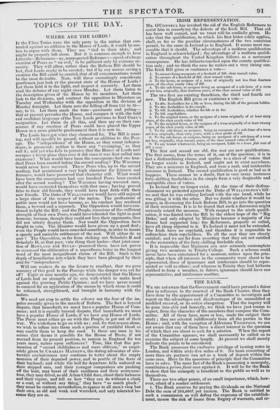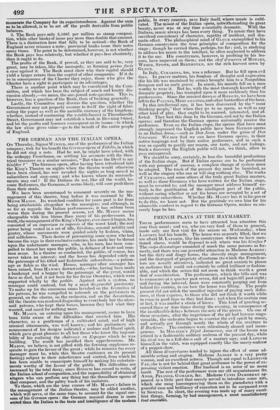THE BANK.
WE arc not aware that the Government could have pursued a fairer plan in reference to the renewal of the Bank Charter, than they have done by the appointment of a Committee to investigate and report on the advantages and disadvantages of its unmodified or modified renewal, or its entire abrogation. That the inquiry will be gone into ably and honestly, we think we have just reason to expect, from the character of the members that compose the Com- mittee. All of them have, more or less, made the subject their study ; they are selected indifferently from all the parties in the House ; and, with the exception of Alderman THOMPSON, we are not aware that any of them have a direct interest in the question of which they are about to seek for a solution. When the report of the Committee appears, we shall necessarily be called on to examine the subject at some length. At present we shall merely indicate the points to be considered. The Bank possesses the exclusive privilege of issuing notes in London, and within sixty-five miles of it. No bank consisting of more than six partners can act as a bank of deposit within the same area. Here lie the questions of principle that the Committee have to solve. The mere fact of the Bank's possessing a monopoly, constitutes a prima facie case against it. It will be for the Bank to show that the monopoly is beneficial to the public as well as to themselves.
There are two other points, of no small importance, which, how- ever, admit of a readier settlement.
1. The Bank receives for paying the dividends on the National Debt the sum of 260,0001. per annum. The Bank is entitled to such a commission as will defray the expenses of the establish- ment, insure the risk of losses from forgery of warrants, and re- munerate the Company for its superintendence. Against the sum so tobe allowed, is to be set off the profit derivable from public - balances.
2. The Bank pays only 3,5001. per million as stamp composi- tion, while other banks of issue pay more than double that amount. There is a distinction here that falls to be noticed—the Bank of England never reissues a note; provincial banks issue their notes many times. The point to be determined, however, is not whether the Bank .pays less relatively, but whether it pays less absolutely, than it ought to do.
The profits of the Bank, if proved, as they are said to be, very great, may be taken, like the monopoly, as forming prima facie a case against. it. The Bank must show why their capital should yield a larger return than the capital of other companies. If it do so in consequence of the Charter they enjoy, those who give the Charter have a right to participate in its advantages.
There is another. point which may be considered by the Com- mittee, and which has been the subject of much and knotty dis- cussion already,—we mean, the one-pound note question. This is, hOWever, less a question of the Bank, than of banking generally. Lastly, the Committee may discuss the question, whether the Government may not properly assume to itself the right of fabri- cating the paper as well as the metallic currency of the kingdom; whether, instead of continuing the establishment in Threadneedle Street, Government may not establish a bank in Downing Street, and let the profits and bonuses consequent on its issues—to which the law- alone gives value—go to the benefit of the entire people of England. •



























 Previous page
Previous page